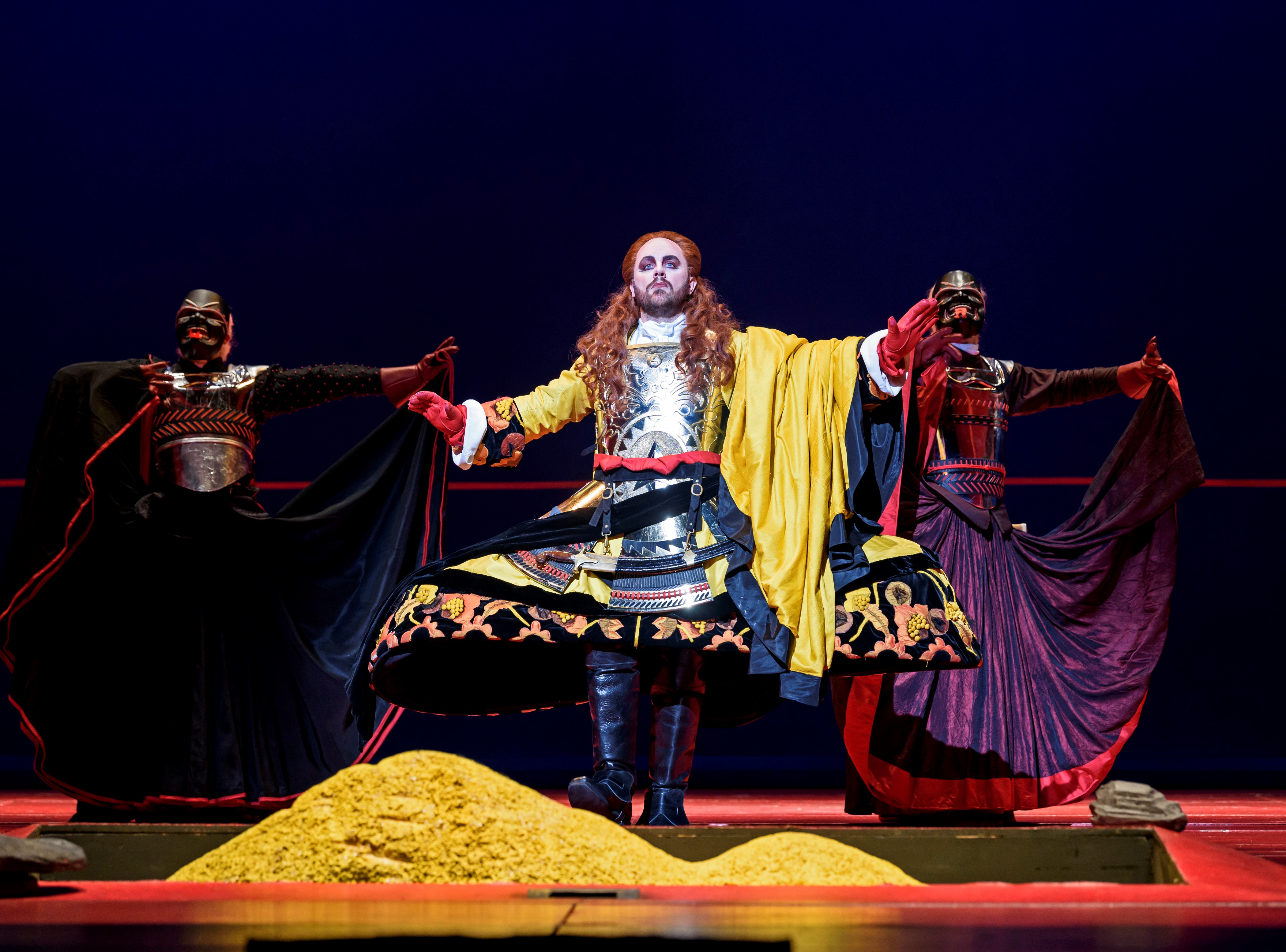 United Kingdom Mozart, Mitridate, rè di Ponto: Cast, Orchestra of the Royal Opera House / Christophe Rousset (harpsichord). Royal Opera House, Covent Garden, 26.6.2017. (CC)
United Kingdom Mozart, Mitridate, rè di Ponto: Cast, Orchestra of the Royal Opera House / Christophe Rousset (harpsichord). Royal Opera House, Covent Garden, 26.6.2017. (CC)

Cast:
Mitridate – Michael Spyres
Aspasia – Albina Shagimuratova
Sifare – Salome Jicia
Farnace – Bejun Mehta
Ismene – Lucy Crowe
Marzio – Rupert Charlesworth
Arbate – Jennifer Davis
Production:
Director – Graham Vick
Set Designer – Paul Brown
Lighting Designer – Nick Chelton
Choreography – Ron Howell
In a season that has seen a lot of changes in advertised singers (not necessarily at Covent Garden: remember Jurowski’s Mahler 8?), the Royal Opera’s Mitridate held two casualties: Salome Jicia replaced Annett Frisch in the role of Sifare (Mitridate’s younger son), while in a much smaller role Russell Preston Fine replaced Lockhart Ogilvie as one of Mitridate’s Attendants. That said, the end result remained magnificent. This is not a short opera (6.30 pm start, approximately 10.15 pm finish) and it holds its own issues. Mozart, 14 at the time of writing – Mitridate is K87/74a – only offers one duet (at the end of the second act) and one ensemble, right at the end. The rest is a procession of admittedly wonderful solos. Certainly, for this listener, the hours passed far swifter than in the recent Verdi Traviata.
Graham Vick’s staging was first seen in 1991. A heady mix of Baroque and Oriental theatre, it exists against Paul Brown’s simple yet effectively colourful sets. A separate round of applause should be given to those on stage who have to wear costumes that make them resemble walking furniture (as a guide, follow this link; also, this YouTube video of Yvonne Kenny accompanied by Harnoncourt in the aria “Al destin” shows what it looks like with a singer in situ). There is no apology that we are in a very different world, and rightly so; against this are gestures drawn from Japanese theatre and Indian dance. Intriguing and beautiful, one can imagine Mozart’s “Amadeus laugh” in response to its clever approach. Mozart’s opera takes its subject from Parini’s Italian translation of Racine’s play Mithridate. The plot begins with Mitridate being presumed dead (he’s not, he has plenty to sing) before moving on to treachery (Farnace). Revenge and love, twin backbones of opera seria, provide the dramatic thrust.
Mozart’s demands on his singers, and occasionally on his orchestra, are huge. American Tenor Michael Spyres, who debuted at Covent Garden as Rodrigo La donna del lago in 2013, tackles Mozart’s challenges in the titular role with aplomb. In particular, the voice’s lower register is called upon, often in tandem with huge leaps up to the top in the context of overarching lyricism (“Se di lauri il crine adorno”).
The Russian soprano Albina Shagimuratova’s star is certainly in the ascendant. She had certainly shone in the Proms performance last year of Semiramide (review) although her Queen of the Night for Covent Garden was rather less consistently excellent (actually her Royal Opera debut: review). She was on form for her assumption of the role of Aspasia (a character promised to Mitridate), magnificently involved and dramatic in the extended aria “Nel grave tormento”. No problems with agility or tempo here. On this night her star’s brightness was matched by the wonderful Lucy Crowe as Ismene, whose “Tu sai che m’accese” was a real highpoint. Interestingly, Crowe reprises Gilda Rigoletto next season; something most definitely to watch out for.
Countertenor Bejun Mehta, who has been seen as Angel 1/The Boy in George Benjamin’s Written on Skin, was in fine fettle as Farnace (the baddie in all of this), his “Venga pur, minacci” magnificent in its force. Mehta moves easily between earlier musics (teenage Mozart, Handel Rodelina) to the contemporary (in addition to the Benjamin, one should mention his participation in the World Premiere of Hosokawa’s Stilles Meer at the Hamburg State Opera). He inhabits every character he takes on, a true stage presence.
As Arbate, Irish soprano Jennifer Davis, a participant in the Jette Parker programme, made a confident, positive impression, her “L’odio nel cor” suave and touching as well as technically secure. Georgian soprano Salome Jicia, making her Royal Opera debut as Sifare, Mitridate’s younger son, has actually sung Aspasia recently for the State Opera House of Georgia. Jicia’s Sifare was blessed with agility although her actual sound could occasionally veer towards the piercing end of the spectrum. Richard Charlesworth acquitted himself well in the role of Marzio.
Huw Evans supplied the sterling horn obbligato in Sifare’s aria “Lungi da te”. It started out like an instrumental aria that could easily be found in a lost Mozart horn concerto (if only!) and includes a fair share of fireworks. The Royal Opera’s website offers this version as a taster, and readers unfamiliar with this aria might like to follow this link (Christiane Karg with the Berliner Philharmoniker under Iván Fischer, with Felix Dervaux on horn).
The Royal Opera Orchestra, directed by Christophe Rousset on the harpsichord, was superb throughout, excelling in the variegated Overture. Rousset, making his Royal Opera debut, has led this piece also at La Monnaie and Opéra de Dijon, so he is no stranger to its subtleties. His enthusiasm shone through the orchestral contributions.
The performance on July 1 will be broadcast live on BBC Radio 3. Required listening.
Colin Clarke
